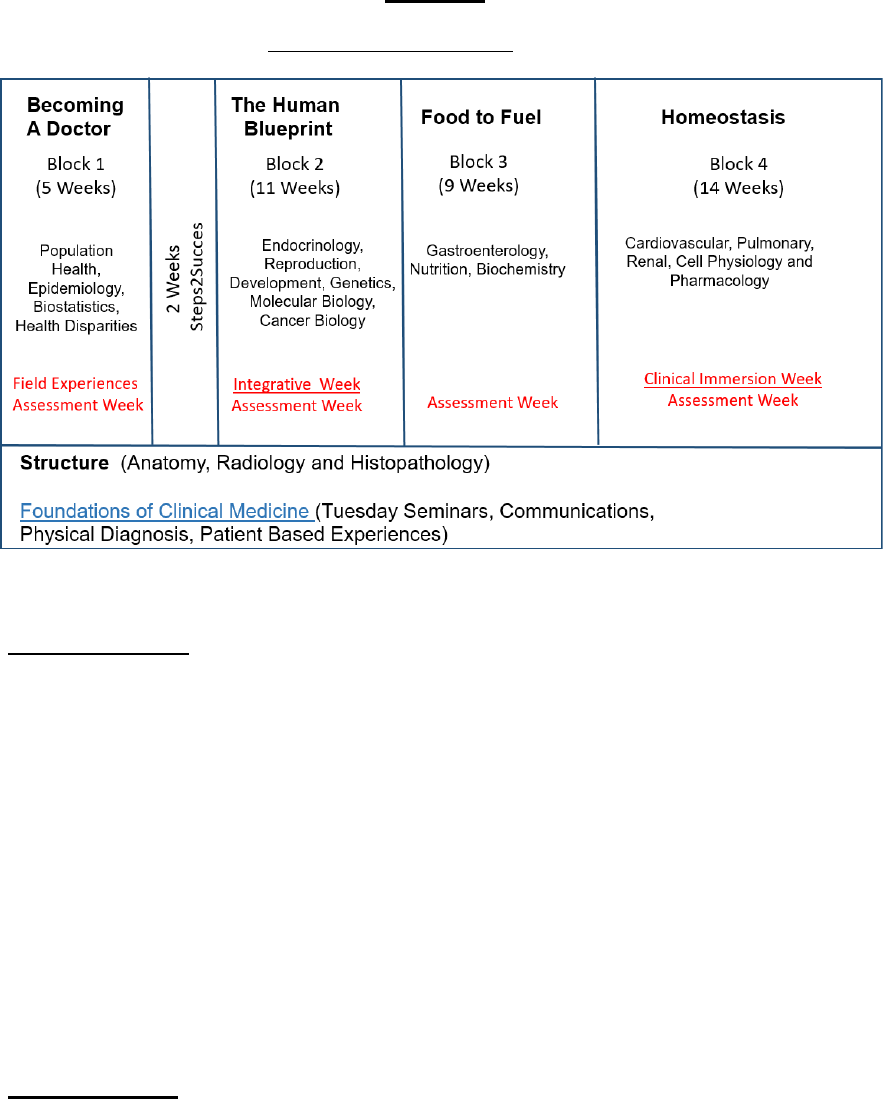
Case Western Reserve University – University Program Medical School Block 1
Action Plan 2023-2024
Year 1 – July through May
1. Course Description:
Block 1, Becoming a Doctor, provides an understanding of population health and the role of the
physician in society. At CWRU SOM, the first five weeks of the curriculum focus on how physicians act
as advocates for patients in health care systems; how social and environmental factors impact health
and the value and importance of population health. Students are introduced to the city of Cleveland as
their first patient and provided with historical and social context for the epidemiological distribution of
disease as well as examples of how community organizations contribute significantly to community
health. Through a variety of experiential and longitudinal learning experiences, students are introduced
to six core disciplines:
Health Systems Science (HSS), Population Health, Health Determinants, Epidemiology and
Biostatistics, Bioethics, and Professional Identity Formation (PIF).
The block initiates students’ life-long learning in medicine, developing competency in Research &
Scholarship, Reflective Practice, Teamwork and Interprofessional Collaboration, Patient Care,
Knowledge for Practice, Professionalism, Interpersonal & Communication Skills, Personal and
Professional Development and Systems-Based Practice. During Block 1 students are also introduced
to content from longitudinal Blocks 7 (Structure) and 8 (Foundations of Clinical Medicine). These
sessions are addressed in separate block action reports.
2. Block Co-Leaders:
Block Co-Leader: Karen B. Mulloy, DO, MSCH
Block Co-Leader: Kimberly Gifford, MD
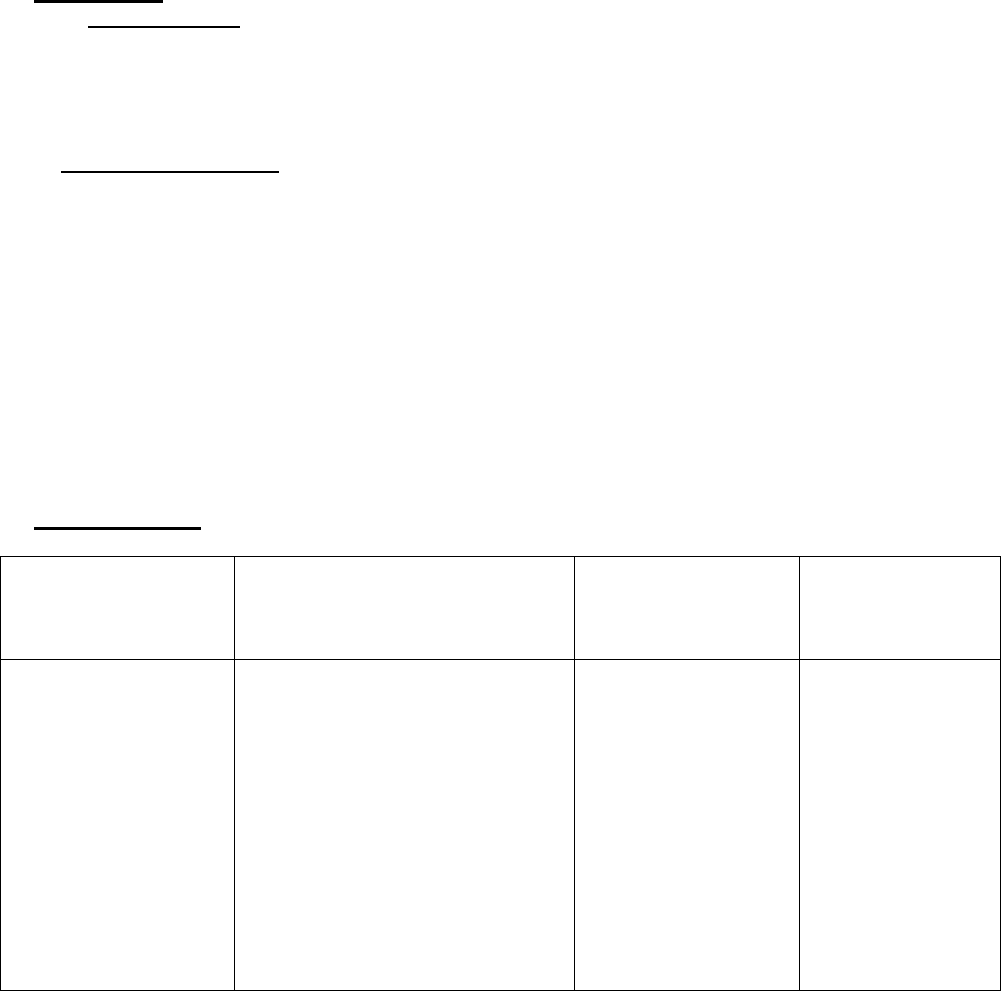
3. Design Team:
Section Leaders
Douglas Einstadter, MD, MPH – Epidemiology/Biostatistics
Johnie Rose, MD, PhD– Health Systems Science
Nicole M. Deming, JD, MA – Bioethics
Heidi Guillett, MD, MPH – Population Health
Design Team Members
Farren Briggs, PhD
Jacqueline Curtis, PhD
Scott Frank, MS, MD
Prakash Ganesh, MD, MPH
Melissa Klein, MD
Suet Kam Lam, MD, MPH
Anastasia Rowland-Seymour, MD
Phillip Rowland-Seymour, MA
Zenobia Tayeb, MD
Course Manager: Deidre Gruning
Field Experience Manager: Kurtis Hoffman
4. Course Objective: Please fill in the table below for your Course Objectives.
Competency and
Definition
Educational Program
Objective
(EPO)
Course Objectives
Block _1_
Recommended
Changes to
Course
Objective
Systems-based
Practice
Demonstrates an
understanding of and
responsiveness to
health care systems,
as well as the ability
to call effectively on
resources to provide
high value care.
Applies knowledge of health care
systems to patient care
discussions
Demonstrates awareness of
context of care, patients’ values,
and health care system resources
in clinical decision
-making.
Applies principles of quality
improvement and safety to patient
care.
Health Systems
Science: Link
domains of Health
Systems Science in
health care
structure, policy,
value and
economics, health
systems
improvement, and
health informatics
No recommended
changes

Knowledge for Practice
Demonstrates
knowledge of
established and
evolving biomedical,
clinical,
epidemiological and
social-behavioral
sciences as well as the
application of this
knowledge to patient
Care
Demonstrates ability to apply
knowledge base to clinical and
research questions
Demonstrates appropriate level of
clinical and basic science
knowledge to be an effective
starting resident physician
Population Health:
Illustrate effective
means to measure,
understand, and
affect the health of
populations
No recommended
changes
Knowledge for Practice
Demonstrates
knowledge of
established and
evolving biomedical,
clinical,
epidemiological and
social-behavioral
sciences as well as the
application of this
knowledge to patient
Care
Demonstrates ability to apply
knowledge base to clinical and
research questions
Demonstrates appropriate level of
clinical and basic science
knowledge to be an effective
starting resident physician
Health
Determinants: Apply
a framework for
social, behavioral,
structural, and
environmental
determinants of
health to patient care
and population health
No recommended
changes
Professionalism
Demonstrates
commitment to high
standards of ethical,
respectful,
compassionate, reliable
and responsible behaviors
in all settings, and
recognizes and addresses
lapses in behavior
Commonly demonstrates
compassion, respect, honesty and
ethical practices
Meets obligations in a reliable and
timely manner
Recognizes and addresses lapses
in behavior
Bioethics: Utilize a
framework for
implementation of
bioethical principles
in the practice of
public health,
population health,
health systems
science and clinical
medicine
No recommended
changes
Research & Scholarship
Demonstrates knowledge
and skills required to
interpret, critically
evaluate, and conduct
research
Analyses and effectively critiques a
broad range of research papers
Epidemiology and
Biostatistics:
Utilize principles of
epidemiology and
biostatistics to
interpret scientific
literature and clinical
cases.
No recommended
changes
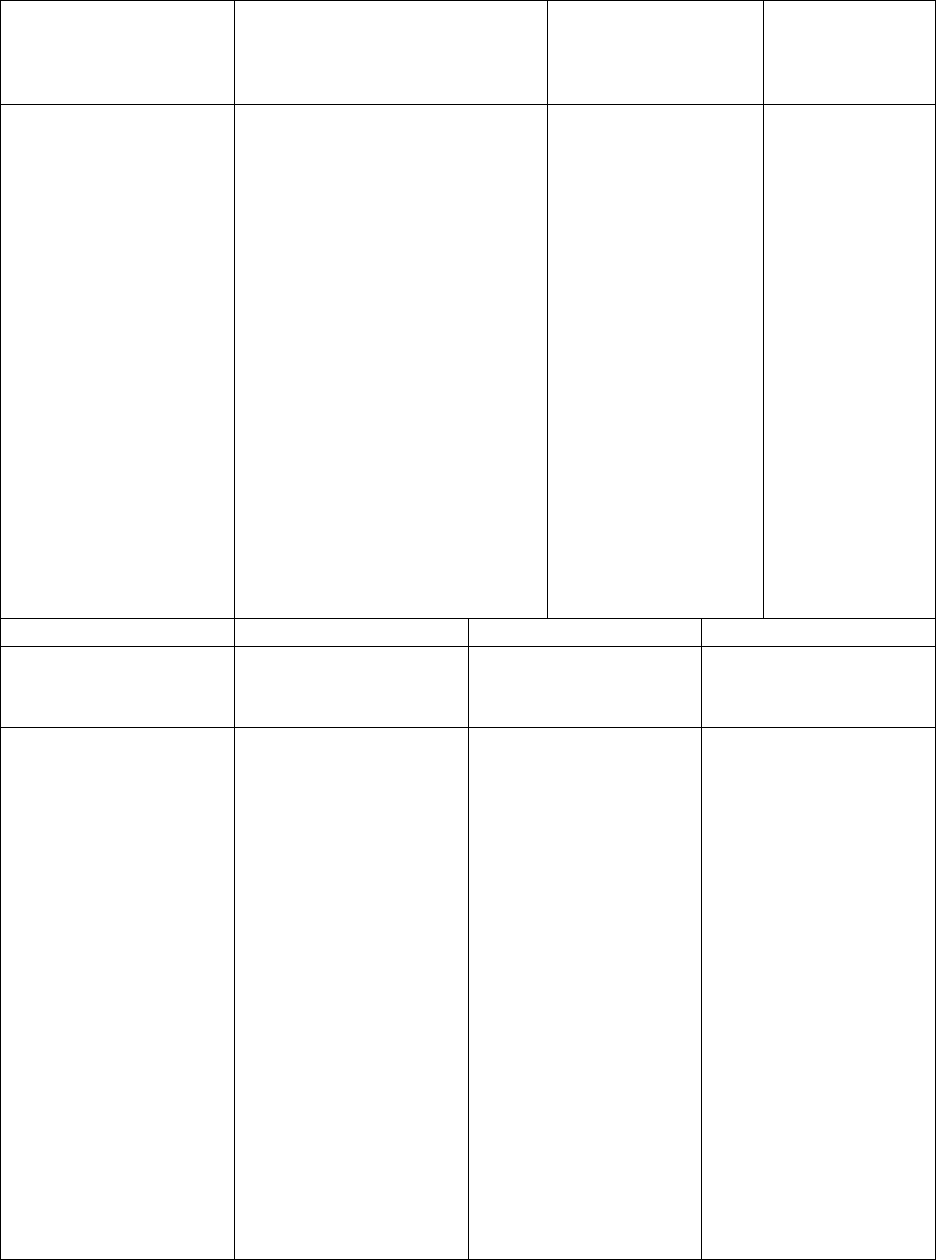
Competency and
Definition
Educational Program
Objective
(EPO)
Course Objectives
Block 1
Recommended
Changes to
Course
Objective
Personal and
Professional
Development
Demonstrates the
qualities required to
sustain lifelong
personal and
professional growth
Critically reflects on personal
values, priorities, and
limitations to develop
strategies that promote
personal and professional
growth
Identifies challenges between
personal and professional
responsibilities and develops
strategies to address them
Recognizes when personal
views and values differ from
those of patients, colleagues,
and other care givers and
reflects on how these can
affect patient care and
research
Professional
Identity Formation:
Explore professional
values and career
paths to create a
foundation for
professional identity
development.
No
recommended
changes
Common to all Blocks:
Competency and
Definition
Educational Program
Objective
(EPO)
Course Objectives Block
Recommended Changes
to Course Objective
Knowledge for Practice
Demonstrates
knowledge of
established and evolving
biomedical, clinical,
epidemiological and
social
-behavioral
sciences as well as the
application of this
knowledge to patient
C
are
Demonstrates ability to
apply knowledge base to
clinical and research
questions
Demonstrates
appropriate level of
clinical and basic
science knowledge to be
an effective starting
resident physician
Recognize and analyze
ethical problems in
clinical medicine and
biomedical research
using the principles of
autonomy, beneficence,
nonmaleficence and
justice.
None

Competency and
Definition
Educational Program
Objective
(EPO)
Course Objectives Block
Recommended Changes
to Course Objectives
Teamwork &
Interprofessional
Collaboration
Demonstrates
knowledge and skills to
promote effective
teamwork and
collaboration with health
care professionals
across a
variety of settings
Performs effectively as a
member of a team
Develop and practice the
knowledge and skills
that promote effective
teamwork across a
variety of settings.
None
Professionalism
Demonstrates
commitment to high
standards of ethical,
respectful,
compassionate, reliable
and responsible
behaviors in all settings,
and recognizes and
addresses lapses in
behavior
Commonly
demonstrates
compassion, respect,
honesty and ethical
practices
Meets obligations in a
reliable and timely
manner
Recognizes and
addresses lapses in
behavior
Understand and practice
the behaviors of an
ethical, respectful,
compassionate, reliable,
and responsible
physician.
None
Interpersonal &
Communication Skills
Demonstrates effective
listening, written and oral
communication skills
with patients, peers,
faculty and other health
care professionals in the
classroom, research and
patient care settings
Uses effective written
and oral communication
in clinical, research, and
classroom settings
Demonstrates effective
communication with
patients using a patient
-
centered approach
Effectively
communicates
knowledge as well as
uncertainties
Understand and
demonstrate effective
communication skills for
learning and clinical
practice environments.
None
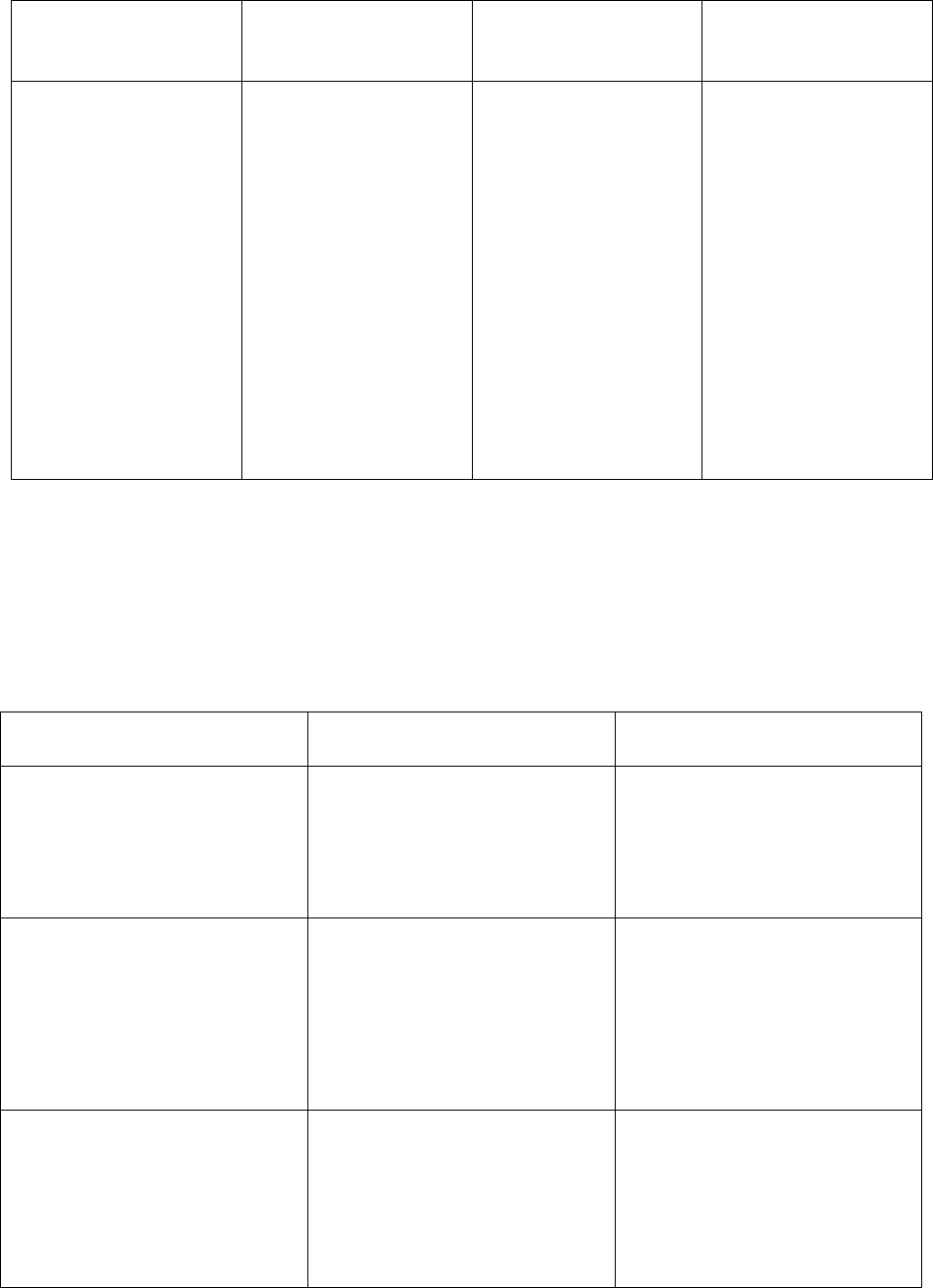
Competency and
Definition
Educational Program
Objective
(EPO)
Course Objectives
Block
Recommended
Changes to
Course Objectives
Research & Scholarship
Demonstrates
knowledge and skills
required to interpret,
critically evaluate, and
conduct research
Analyses and effectively
critiques a broad range
of research papers
Demonstrates ability to
generate a research
hypothesis and
formulate questions to
test the hypothesis
Analyze, critique and
present research studies
from the primary
literature.
None
Demonstrates ability to
initiate, complete and
explain his/her research
5. In the grid below, please list the specific course changes you made this year based on last year’s
report.
What
changes
were
made
2023-
2024?
How
did
the
changes
work?
What would you like to change
next
year
2024-2025?
All class during the first week of
Block 1 and lectures in week 2 that
introduced major goals and
concepts were made mandatory
attendance.
Improved participation by the
students during Q & A
sessions and with discussion
with the lecturers.
Continue with 1
st
week and part
of second week as mandatory
attendance. Discussion with
design team to determine what
other sessions may be made
mandatory.
Reviewed the major concepts
i.e. population health,
Social
Determinants of Health (
SDH),
HSS and PIF and
worked with
design team to choose graphics
to be used by lecturers to
provide a consistency in the
concepts.
Consistency across the
lectures helped students to
better comprehend complex
concepts.
Continue to refine the graphics
to better link the concepts.
A major review of all the lectures
to determine if some lectures
could be replaced by more active
learning sessions.
One lecture was dropped to
add small group sessions to
the community solutions
panel. One lecture was
converted into a mini lecture
with small group and
interactive learning.
Continue to evaluate lectures
for more interactive components
or sessions.

Expanded teaching on PIF with a
lecture and interactive session in
orientation week and in Block 1.
Students given guidance and
instruction on reflections and
journaling to help in PIF.
94% of the students stated
they agreed and strongly
agreed with the question in the
end of the Block survey” I
thought about how my own
career path relates
to the content of the course.”
Continue to expand on PIF
within the Block and improve
linking the goals of PIF with
student involvement.
Preparation readings for Team
Based Learning (
TBL) and
Active Learning in Teams (
ALT)
sessions and some lectures
were annotated to help guide
students on how to prepare for
the sessions
Improved student preparation
for TBL and ALT sessions.
Continue to expand the
annotations for all pre-reading.
Reviewed all reading materials
to consider other multi
-media
resources for preparation for all
sessions.
Readings were replaced with
pod-casts and videos.
Feedback from students was
positive. Better preparation for
some sessions than in previous
years.
Continue to evaluate readings
and to consider other multi-
media resources.
Expanding use of IPADs
Incorporated the IPAD for
students to set up a journal to
document reflections on PIF.
Continue to work with
leadership in evaluation of the
IPAD use and other initiatives
that help to make the med
school Greener.
Worked with orientation group to
improve IQ training
The orientation IQ case had
expanded concepts that not
previously a part of orientation
and that allowed students to
start to develop broader
concepts and be better
prepared for IQ.
Continue to work with the
orientation group on IQ training.
Highlighted importance for
students to prepare for field site
visits at several times during
Block orientation and frequent
reminders.
Field site feedback indicated
students were engaged and
prepared.
Continue to work with students
a needed preparation to get the
most out of the experiences.
Each lecturer introduce
t
hemselves and spend a few
minutes describing the journey
of how
they chose medicine and
their specialty as a part of
helping students in their own
professionalism identity
formation
. Expanded that to the
IQ facilitators.
Positive feedback from students
in the end of Block survey.
Continue to incorporate IF into
introductions and link with
course content.
Work with the Diversity in the
Curriculum Design Team on
the integration of SES issues in
the curriculum.
Increased discussion of
Socioeconomic Status (SES)
factors with prompting
questions
Continue to work with the
Diversity in the Curriculum
Design Team on the integration
of diversity issues in the
curriculum.
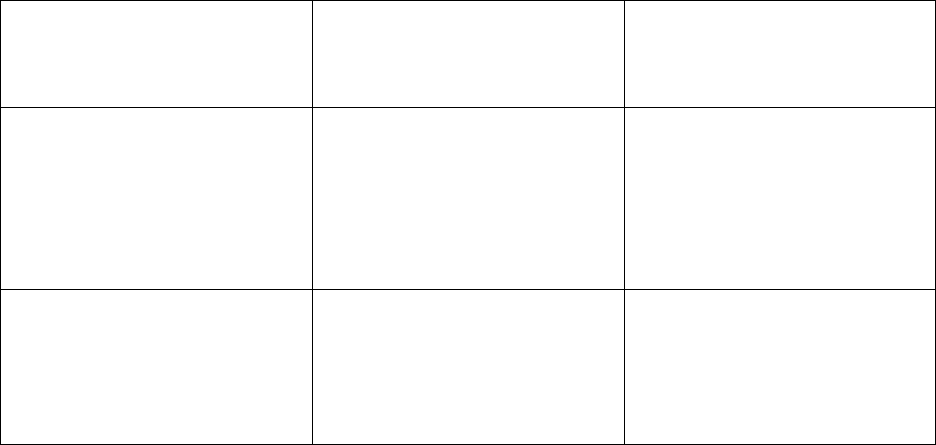
Update the pandemic exercise
including the pre-reading and
the role descriptions
and added
more interaction in the scenario
– Avian influenza was the
pathogen this year.
Student feedback was positive
with suggestions for more
interaction to role models.
Continue to update pandemic
exercise.
TBL and ALT updated.
Overall positive feedback.
The conclusion on the climate
change was improved from
previous year but will continue
to make the issues on
adaptation and mitigation more
interactive.
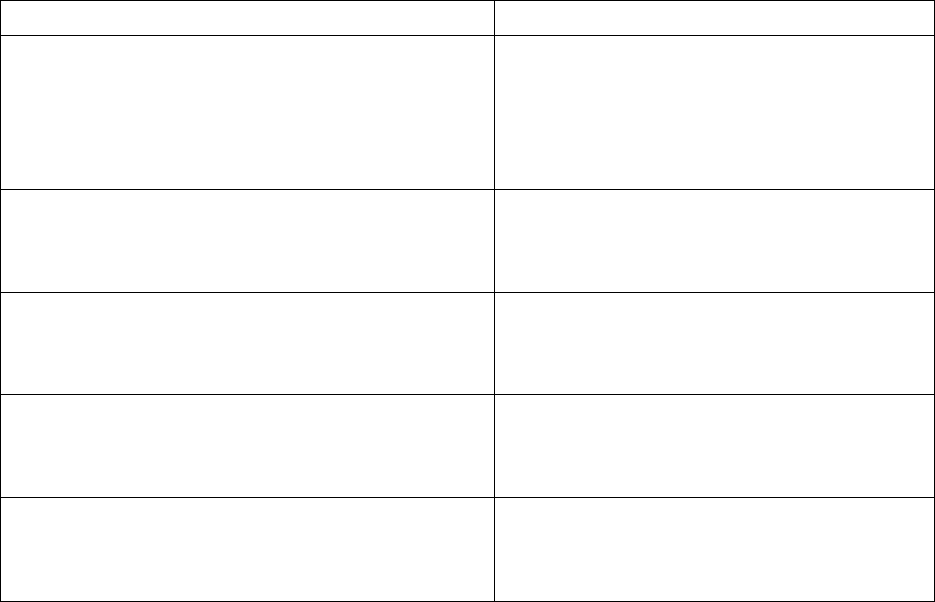
6. What additional changes do you anticipate making to the Block in the next academic year
(lectures, TBL, IQ cases, other)?
7. What successful, innovative components of your block that are best practices that you would
like to share with the other Blocks?
We continued to have presenters introduce themselves and spend a few minutes describing their
journey as they developed their professional identity and practice .This provided students a wide
variety of perspectives and was introduced to them as a way for them to start their professional identity
journey. Some student’s couldn’t relate to the profession journey of those in Becoming a Doctor, other
Blocks may consider including this strategy or others to encourage students to continue to explore and
develop their professional identity in ways that link with their block.
We also are working on strategies for students to keep a “My Story” professional identity journal. We
do not yet have best practices fully defined, but are happy to share some approaches and would
welcome others ideas about how to continue to help students develop their professional identity in
each course.
Changes
anticipated
for
next
academic
year
Reason
for
changes
(evidence/feedback)
Create an interactive ethics session or mini lecture
interactive problems.
Students have a basic understanding of how
to define ethical principles but have difficulty
in to applying concepts in cases especially
when principles are in conflict with each
other. An interactive session will give
students the practice that they need.
Evaluate how to better integrate the major themes
of the Block.
Student feedback has indicated that there is a
disconnect between the concepts and how
they are related.
Evaluate all large group session Learning
Objectives (LOs) to ensure the alignment with
course objectives and desired outcome of the
content covered.
Student feedback and transition to the new
LMS that for some sessions that there was
not alignment.
Better integrate PIF activities and encourage
students to continue outside of class, offer
alternative modalities and ways to interact with
others about it.
Student feedback about integration,
discussion, and alternative modalities.
Intensive training to prepare the students for how to
get the most out of TBLs is needed. Will work with
the orientation team to develop a robust TBL
training.
Student feedback noted that the discussions
amongst the groups was very varied with not
all students understanding how to use the
time for the group learning process.

8. Did formative (MCQs and SEQs) and summative assessment (SSEQs) in the Block support
achievement of course objectives? What specific changes do you plan to make to the course
next year?
Changes
anticipated
for
next
year
Reason
for
changes
(evidence)
Review assessment map to evaluate content
and depth of both the SEQs and SSEQs.
Update to reflect added material in the last
several years and to be consistent with all
levels of Bloom’s taxonomy.
New SSEQ will be created
Link to new material in Block.
New questions related to epi/bio to be
created for students to practice skills in
interpreting results in studies.
Student feedback had noted the practice
session completed in the ALT was extremely
helpful and had asked for more practice
questions.
9. Describe how faculty teaching quality was reviewed for your block. What faculty development
opportunity was offered in response to student feedback?
Co-leaders attended all lectures to help in the evaluation of content. Content-specific Block 1
evaluations are reviewed by the Block 1 Design Team annually. Added review of large group LOs will
be conducted this year. Individual faculty evaluations are reviewed by the Block 1 Leaders who directly
address specific concerns with individual faculty when necessary. We provide annual Team Based
Learning training to Block 1 faculty and facilitators. Individual IQ facilitator training and feedback is
handled separately by the IQ evaluation team. All Block 1 faculty are encouraged to participate in the
Center for Advancement of Medical Learning professional development workshops.
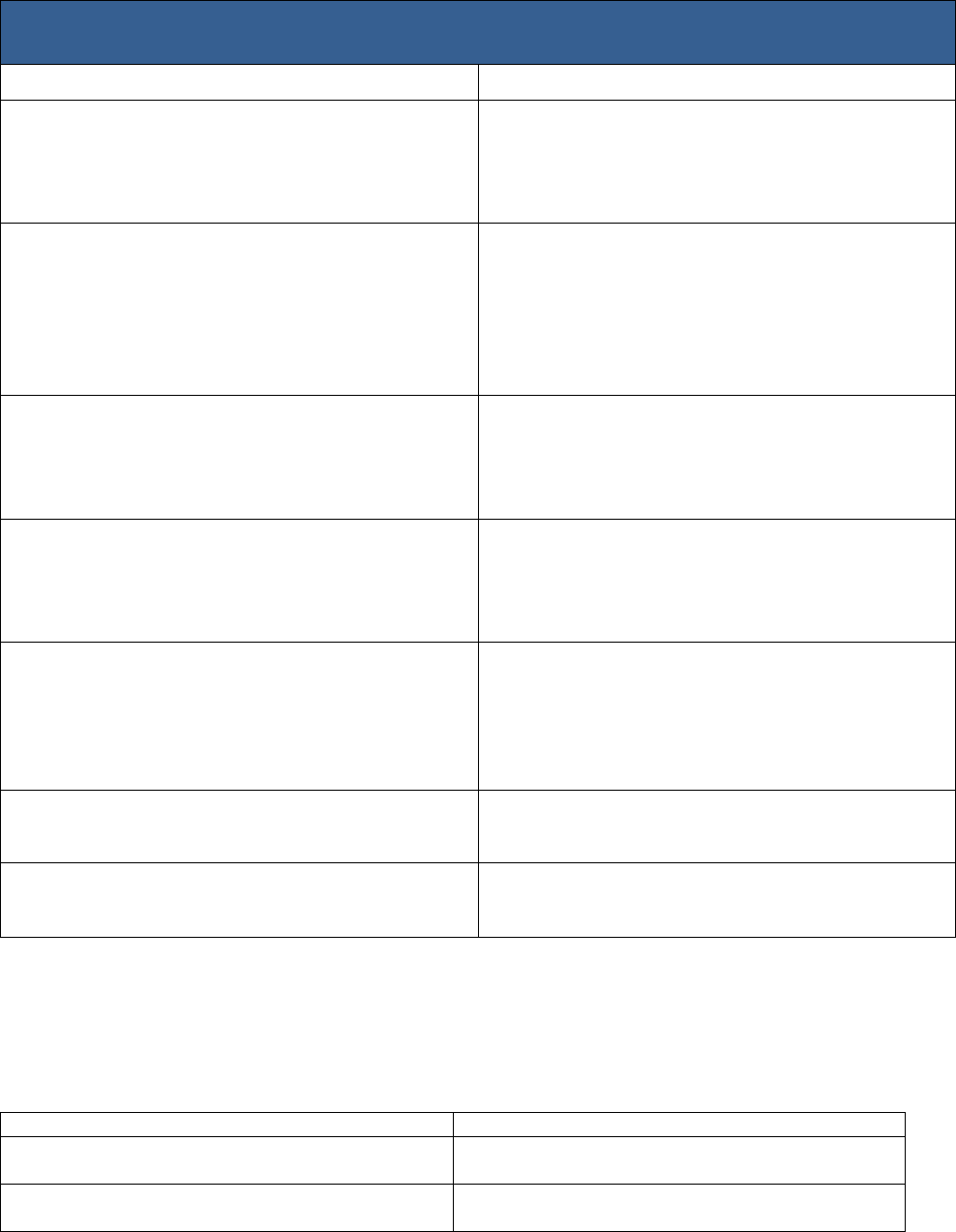
10. What changes have you have made, or you anticipate in making to better prepare students to
care for diverse population.
Block 1 Becoming a Doctor
Highlighted Faculty Responses to Student Feedback
Student Feedback
Action Items
Learning Objectives matching lecture content
This was partially related to the early deadlines
for Elentra. We will have more time this year to
review LOs, ensure they are matched to course
objectives and keywords and ask speakers to
signpost them throughout their talk.
There was a lot of variability of experiences in
TBL/ALT – some students loved it and others
thought their groups were dominated by 1-2
people or only focused on coming up with a
right answer rather than looking at pros/cons of
each choice (as was the expectation). Students
asked for more oversight over the groups.
We would like to discuss how students are
oriented to TBL. Will work with the orientation
team to improve TBL orientation and training.
We will try to reiterate the process. We will also
circulate to check in on groups more.
PIF journal integration. Many students wanted
to work on this more outside of class and to
discuss with others. They also asked for more
prompts.
We will explicitly encourage students to use
class time to capture notes and continue to write
outside of class. We will also encourage
different modalities to explore PIF and discuss
with others. We are piloting some of this now.
Students commented on lack of integration of
topics, but quantitatively integration was good
overall.
Last year we worked on keywords and central
organizing images to be the central themes.
We will now work to better show integration
between these themes and highlight them
throughout.
4 hours of lecture is too much
We tried to include both large and small group
activities, but do not have full control over the
schedule. Before IQ starts and as concepts are
introduced, we probably need to have more
large group sessions. We will look at the
schedule and try to adjust if possible.
Resource annotation was helpful
We will expand these annotations to more
sessions.
Elentra had a learning curve
It will not be new next year – the specific
feedback will be addressed by the Elentra team
rather than our block.
This year
Next Year
Mandating attendance for all community
panels.
Continue to expand representation of wide
diverse populations in NE Ohio.
Field site visits to expand student’s experiences
with a wide group of diverse population.
Expand on examples of diverse populations’
experiences.

11. Acknowledgement
Block 1 core disciplines of Bioethics, Population Health, Health Determinants, Health Systems
Science and Professional Identity Formation encompass continually evolving and developing
fields of study, and we are tremendously grateful to the tireless commitment of our Block 1
design team and core faculty for continually updating and adjusting both content and delivery.
We would also like to thank the M1 and M2 students for their work on the Block 1 curriculum
and suggestions for inclusions and improvement.
We cannot thank Deidre Gruning enough for her most important contributions as our course
manager. Her knowledge and understanding of the complexities of the curriculum and her
strong organizational and executive skills were essential in the delivery of Block 1. She is a
rock star! In addition, a special appreciation to the staff that came in early for the pandemic
exercise, Elizabeth Day and Nivo Hanson, and the TBLs, Dawn Reid, Natalie Scala and Kathy
Dilliplane, to make sure the rooms were set up appropriately and the make sure the faculty and
community members knew what room they were going to. We cannot thank you enough.
Huge thanks to Kurtis Hoffman. Without his high level of organization and timely response to
all our community partners with the utmost of professionalism and sensitivity, the field
experiences, a critical component of Block 1, simply would not have been possible.
We also thank Celinda Miller for her tremendous work in coordinating the IQ experiences and
helping to get a reduction in the amount of paper used. We are grateful for the help of all
members of UTech. But a special appreciation for Victor Guinto, Darin Johnson, Diana Nguyen
and Paul Salzgeber for all their help in making sure the lecturers got the right PowerPoint and
helping to make everything run so smoothly.
We would also like to thank Kelli Qua, Yifei Zhu, Kathy Dilliplane and Xiaomei Song and the
entire assessments team for added assistance in updating the SEQs and SSEQs. We remain
so grateful for the tremendous teamwork that is necessary for the students to have an
optimized learning experience in Block 1.
12. Response to Program Evaluation Committee (PEC) Report
We reviewed the PEAC report and it was noted that that the overall block rating has steadily
increased and is at 82%. The recommendations for improvement are in alignment with the
plans for changes and improvements that are noted in this report. Specifically plans for
improvement on TBL, ALT, lecture LO alignment and integration of the course objectives are
being addressed.
Students delivered the Bias in Med Ed lecture
and led the panel discussion.
We will discuss with our design team about how
to create more space for students to share their
expertise related to aspects of their identity
without forcing/requiring that they share things
they may not yet be ready to share.
Discussion during IQ cases on the zip code that
is part of the patient identity card completed by
probing questions.
Add Official Learning Objective (OLO) on the
zip code and how that related to patient
diversity to several of the IQ cases.
